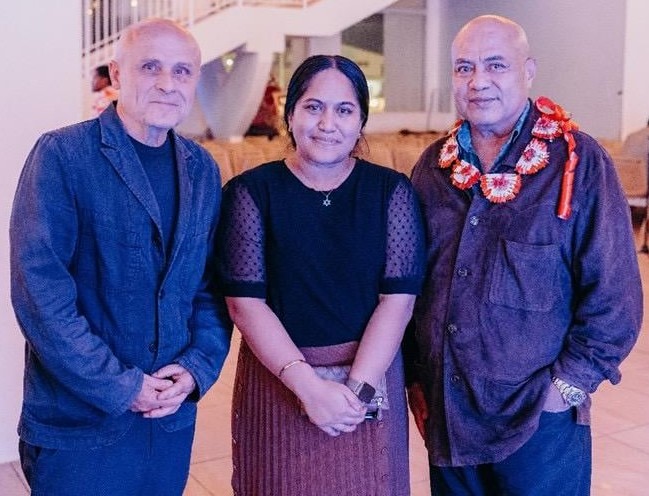At the High-Level Ocean Dialogue on the sidelines of the Forum Leaders Meeting in Nuku’alofa, Tuvalu’s Prime Minister Feleti Teo delivered a powerful message urging immediate and coordinated action to protect the Pacific’s vast marine resources.
Emphasising the role of the Pacific nations as “Large Ocean States,” Teo called for a global recognition of their unique challenges and contributions in the fight against climate change, illegal fishing, and marine pollution.
Prime Minister Teo highlighted the indispensable connection between the Pacific’s Ocean resources and the livelihoods of its people.
He acknowledged the resilience of Pacific Islanders, who have not only adapted to the challenges posed by their environment but have also played a pivotal role in managing some of the world’s most significant ocean territories.
“It is a true honour to speak with you today on a topic that is central to the lives of Pacific people.
“Our narratives have evolved over time, from Small Island States to Large Ocean States. This shift is not just symbolic but a call for our partners to recognise that a significant portion of the Common Heritage of Humankind is within our jurisdiction, notably in the Pacific—our home and our backyard,” PM Teo said.
Teo’s remarks come at a critical time as Pacific nations face an array of existential threats, from climate change to illegal fishing and marine pollution. These challenges, Teo argued, are not only environmental but also geopolitical, affecting the very sovereignty and security of Small Island Developing States (SIDS) like Tuvalu.
“Our security and sovereignty are further compromised by the pressures on the ocean such as illegal fishing, marine pollution, and rising sea levels,” Teo warned. “Thus, collaboration is essential to tackle these complex and interconnected issues.”
The Prime Minister emphasised the need for a robust and coordinated response, both regionally and globally. He called for the enhancement of existing regional mechanisms, including those managed by the Council of Regional Organisations in the Pacific (CROP), to better address the transboundary issues that threaten the Pacific’s ocean resources.
“Regional collaboration with neighbouring countries and organisations involving CROP must improve to enhance the collective management of shared marine resources and address transboundary issues,” Teo stressed.
He pointed to Tuvalu’s recent launch of coastal fisheries management plans for eight outer island communities as a successful model of co-management between government and local communities.
PM Teo also touched on the broader challenges facing Pacific nations, particularly their economic dependency on primary sectors like fisheries and the difficulties they face in accessing international financing mechanisms.
“The challenges we face are substantial: our geographical and logistical isolation, vulnerability to climate change and biodiversity loss, economic dependency on primary sectors like fisheries, and difficulties accessing international financing mechanisms,” he outlined.
However, Teo was clear that these challenges also present opportunities—particularly through the development of a sustainable blue economy.
He advocated for initiatives that not only support economic growth but also enhance the resilience of fish stocks and marine ecosystems.
“Sustainable blue economy initiatives, such as sustainable fisheries management, not only support our economies but also enhance fish stocks and resilience,” he said.
Teo called for stronger international partnerships to help Pacific nations access the necessary funding, technology, and expertise to build resilient and sustainable ocean governance systems.
“International support and cooperation have never been more important. Small Island States, or Large Ocean States like Tuvalu, must leverage global partnerships to access funding, technology, and expertise and to enhance ocean resilience,” Teo urged.
The Prime Minister also emphasised the importance of translating global advocacy into tangible results at the community level, calling for greater policy coherence and the establishment of a national ocean policy in Tuvalu.
“Our global advocacy, including efforts in the COP processes, must translate into tangible results at the community level,” he said. “It is time to establish a national ocean policy in Tuvalu, a cohesive strategy to address both the challenges and opportunities of managing our ocean resources.”
Teo underlined the critical need for strengthened ocean governance, both through coherent national policies and adequate international financing.
He called for the international community to recognise the unique vulnerabilities of SIDS and to provide the necessary support to ensure their long-term sustainability.
“Strengthening ocean governance through coherent policies and adequate financing is vital for the sustainability, economic stability, and resilience of Small Island Developing States,” he asserted.
One of the central themes of Teo’s address was the ocean-climate nexus—a complex challenge that intertwines biodiversity loss, marine pollution, and climate change.
He called for a holistic approach to these issues, emphasising the need for coordinated regional efforts facilitated by institutions like the Office of the Pacific Ocean Commissioner (OPOC).
“Tuvalu supports the use of regional offices like the Office of the Pacific Ocean Commissioner to develop and strengthen effective regional ocean mechanisms,” Teo stressed.
He praised the OPOC for its role in facilitating the Pacific Ocean Alliance, delivering the Blue Pacific Ocean Report, and reviewing regional ocean policies to ensure ongoing coherence.
“Robust coordination of ocean governance policies and initiatives is critical given the multitude of players in the ocean space,” he added.
Teo expressed confidence that the steps being taken today will secure a healthy and resilient ocean for future generations.
“While we cannot guarantee the future, we take comfort in knowing that we are taking the necessary steps today to ensure that we leave behind a legacy of healthy and resilient Oceans for our future generations,” he said.














